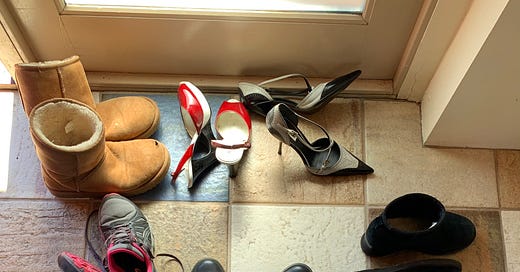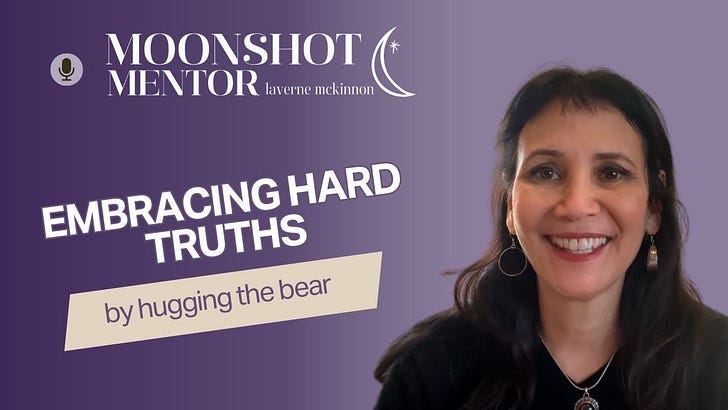Update: I’m now offering free coaching for referrals! Click the button below to learn more.
One day, I think I was about four-years-old, I went to my friend Christy’s house. Two doors down on the left. We had just learned how to use the telephone and I loved calling up to ask if I could go over.
When I got to Christy’s house, I slipped my shoes off and left them neatly at the door. Christy’s mom Dolly asked, “What are you doing?”
I didn’t understand the question and said, “Christy said it was okay for me to come over.” I thought I was getting in trouble for walking in their house without ringing the doorbell.
Nope, she wanted to know why my bare (stinky) feet were puttering across their nice carpet.
My family didn’t wear shoes in the house. When we came home, we took off our gym shoes (that’s what we Midwesterners called sneakers) and wore “house” shoes. We had outside shoes and inside shoes. Didn’t everyone?
In many Asian countries, it’s tradition to remove shoes before entering the house. My mom was Japanese and grew up in Osaka, Japan so she brought this tradition to our neck of the woods in good ol’ Darien, Illinois. There was only one other Asian family - they lived down the street from us — but that was it. So this tradition was an anomaly in the community I grew up in, but I didn’t know that until I was faced with something different. I thought everyone took their shoes off before going into the house.
I share this story in reference to Imposter Syndrome because we don’t know what we don’t know. I, along with other women and people of color, have been taught that the feelings we experience of not belonging, not fitting in, and being a fraud are feelings of our own making. We are solely responsible for not feeling good enough.
When I first heard the term “Imposter Syndrome,” I felt relief. It was good to know that there was a name for the feelings of doubt that I had at school and at work.
Anytime we can notice and name something, we relax - even if the thing itself is not so great. Having clarity diminishes the discomfort of not having the answers. I have a friend who had mysterious medical symptoms. When they were told they had Hashimoto’s disease, they felt a sense of freedom because they then knew what they had to do to manage it.
As I grew older and learned more about Imposter Syndrome, I sorta enjoyed being a part of this vast community of over-achieving, ambitious people. And most importantly, that there was nothing wrong with me since I wasn’t the only one having these feelings.
But then I discovered I may have been gaslit the whole time.
February 2021. Ruchika Tulshyan and Jodi-Ann Burey publish an article for Harvard Business Review, entitled “Stop Telling Women They Have Imposter Syndrome.” They state that “feeling like an outsider isn’t an illusion - it’s the result of systemic bias and exclusion.”
My mind was blown. Imposter Syndrome is the result of systemic bias and exclusion?! It’s not because I don’t have the ability to internalize my own success?
I was back being a little kid at Christy’s house learning that not everyone has inside shoes and outside shoes.
Tulshyan and Burey posit that “the intersection of race and gender often places us in a precarious position at work.”
Perhaps those suffering from Imposter Syndrome are actually being told in subtle and not so subtle ways, “You don’t belong. You’re not good enough.” Not because of a lack of talent, experience, expertise, intelligence, or work ethic. But because your race and gender are not a match for what’s considered professionally acceptable. I would also add age and disability as additional factors that create conditions of exclusion and were not mentioned in Tulshyan and Burey’s original HBR piece.
Tina Opie, an associate professor from Babson College, says, “Who is deemed professional is an assessment process that’s culturally biased and skewed.”
Were my feelings of not belonging in Hollywood or corporate America actually not just feelings? Was it the truth because I didn’t actually belong?
The first time I went to a press event for my job at CBS was one of my more painful work experiences. I was still new to the role of a prime-time current executive and had never dealt with the media. If I remember correctly, it took place at the Ritz Carlton in Pasadena.
I valeted my old, crappy Nissan Sentra, got my badge, and walked out to the big grassy grounds where cocktail tables and mini-bars had been set up. A few hundred people including my colleagues were milling about and that’s when I realized I was improperly dressed.
I’d invested in what I thought was a smart suit with a short skirt that I wore with low heels assuming I’d be on my feet a lot. Well, everyone else was business casual. And while there were women at the event, it was primarily white men over the age of 40 and I was an Asian woman in her early thirties.
I walked in circles trying to penetrate the clusters of my tightly knit colleagues who were either laughing boisterously or speaking in small intense groups. I tried to chat with people I’d never met before. I took a lot of bathroom breaks to escape not belonging and being a fraud.
No one took me under their wing to side coach me on how to interact. The stares I received over what I was wearing told me I was off-base on my wardrobe choice. At one point, a bunch of the men sat at a table and smoked cigars while watching people walk by. Maybe they were making comments, maybe they weren’t. It all just felt horribly uncomfortable.
I internalized that event as a testament to there being something wrong with me: How did I even get here? I don’t wear the right clothes, I don’t know what I’m supposed to say. I don’t like or smoke cigars. I don’t know what I’m supposed to order at the bar. I felt like a failure and was ashamed of my inability to assimilate.
Tulshyan and Burey have identified: “Universal feelings of doubt become magnified by chronic battles with systemic bias and racism.”
What concerns me today is the troubling loss of DEI departments in the entertainment industry, exacerbating cultural problems tied to Euro-centric, masculine, and heteronormative norms in leadership roles. The dismantling of these crucial departments poses significant concerns as it threatens to diminish opportunities for marginalized communities. How can companies grow and evolve if they are not open to feedback, guidance and debate from perspectives other than their own? Media like Fast Company, Variety, Hollywood Reporter, CNBC, Financial Times and more have extensively covered this issue.
Without oversight, blame is placed on marginalized individuals, attributing their lack of advancement to imposter syndrome and self-doubt amongst other factors outside their control. This undermines their chances of progressing whether it’s for leadership, junior or entry-level positions. Sadly, I’m not saying anything new here.
Bottom line: Your self-doubt may not be because of your inability to internalize your success. It may be because you are being told that you don’t belong. Read the full article from Tulshyan and Burey here.
And if you still have feelings of self-doubt that manifest in Imposter Syndrome, go back to the fourth essay in this series to find tools to help you cope and move past it. There’s a lot more at stake than your personal advancement.
FWIW, I kept my shoes off at Christy’s house. 😁🤪😜
What, if any, forms of -isms (racism, sexism, age-ism, able-ism, etc) have led you to doubt yourself?

I love to support ambitious, driven people who are feeling stuck and want to regain momentum so they can hit their next big goal. Want to explore working together?
If you’re resonating with what you’re reading, please consider subscribing. What’s that mean?
🙌🏾 You’ll receive regular emails (with lots of heart and a bit of humor) that share a tool or insight from my coaching practice.
🙌🏾 Typically the blog and podcast will have a question at the end to provoke thought that supports you in your growth.
🙌🏾 Updates on offerings, free stuff, recommendations, referrals.


















Share this post